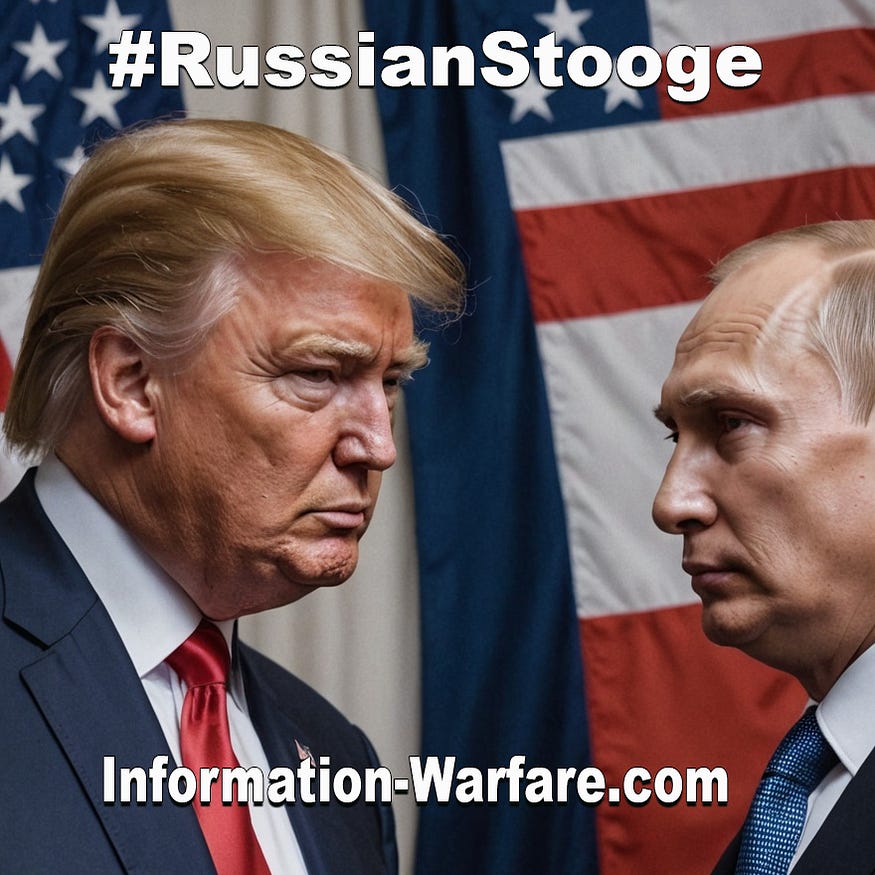The Debate Over Donald Trump as a “Russian Stooge”
Is Trump a Witting or Unwitting Promoter of Russian Interests? Exploring the Nuances of a Politically Charged Claim.
Introduction: The Origins of the “Russian Stooge” Label
The claim that Donald Trump is a “Russian stooge” is a politically charged statement that has fueled intense debate, investigation, and speculation throughout his political career. This term suggests that Trump is either under the influence of or directly controlled by Russian interests, particularly those aligned with the Russian government. The label has become a focal point in discussions about Trump’s foreign policy, his relationship with Russia, and the broader implications for U.S. national security.
1. Investigations and Reports: The Evidence and Its Interpretations
The U.S. intelligence community has consistently concluded that Russia interfered in the 2016 U.S. presidential election with the intent of helping Trump win. This finding is based on a range of evidence, including cyberattacks on political organizations, disinformation campaigns targeting American voters, and efforts to sow discord within the U.S. electorate. These actions were part of a broader strategy to undermine faith in the democratic process and weaken the U.S. on the global stage.
Special Counsel Robert Mueller’s investigation into Russian interference was one of the most high-profile efforts to examine the extent of any collusion between the Trump campaign and Russian operatives. While Mueller’s report did not establish that Trump or his campaign conspired with Russia, it also did not exonerate Trump, particularly concerning obstruction of justice. The report left many questions unanswered, fueling further debate about Trump’s relationship with Russia.
2. Trump’s Actions and Rhetoric: Aligning with Russian Interests?
Critics often point to Trump’s favorable rhetoric towards Russian President Vladimir Putin as evidence of undue influence. Trump’s public praise of Putin, his skepticism of U.S. intelligence assessments regarding Russian interference, and his reluctance to criticize Russia for its aggressive actions on the world stage have all been cited as indicators of a troubling alignment with Russian interests.
On the other hand, supporters argue that Trump’s policies — such as imposing sanctions on Russia, expelling Russian diplomats, and providing lethal aid to Ukraine — are inconsistent with the idea that he is a Russian stooge. They contend that these actions demonstrate a willingness to stand up to Russia and prioritize American interests, challenging the narrative that Trump is overly influenced by the Kremlin.
3. Political Polarization: The Role of Partisan Politics
The term “Russian stooge” is deeply politicized, with interpretations often falling along partisan lines. Critics of Trump use the term to question his loyalty to U.S. interests and undermine his legitimacy as a leader. For them, the label encapsulates a broader concern about Trump’s foreign policy decisions and his potential vulnerability to foreign influence.
Conversely, Trump’s supporters dismiss the “Russian stooge” claim as part of a broader political attack aimed at discrediting him. They argue that the focus on Trump’s ties to Russia is exaggerated and that it serves as a distraction from his policy successes. For these supporters, the narrative is more about political maneuvering than a genuine concern for national security.
4. The Witting vs. Unwitting Debate: Understanding the Nuances
If we define a “Russian stooge” as someone who, knowingly or unknowingly, promotes Russian propaganda or serves Russian interests, then the debate becomes more nuanced.
Unwitting Promotion of Russian Interests: Some argue that Trump’s public statements and policies — such as his skepticism about NATO, his praise of Putin, or his questioning of U.S. intelligence on Russian interference — could be seen as aligning with Russian interests, whether or not he intended them to. Russian state media and propaganda outlets often highlighted Trump’s criticisms of Western institutions, using his statements to bolster their own narratives. Whether Trump was aware of this impact or not is part of the ongoing debate.
Witting vs. Unwitting Idiot: The term “witting idiot” implies that a person is consciously and knowingly promoting propaganda, fully aware of the consequences and the interests they are serving. In contrast, an “unwitting idiot” suggests that a person is unknowingly furthering another country’s agenda, often through actions or rhetoric that align with that agenda, without fully understanding or intending the consequences.
5. Trump’s Case: A Matter of Interpretation
The debate over whether Trump is a witting or unwitting promoter of Russian interests hinges on one’s interpretation of his actions and rhetoric.
Supporters’ View: Many of Trump’s supporters would argue that his actions were always intended to prioritize American interests, and any alignment with Russian objectives was coincidental or misinterpreted. They believe that Trump’s approach to Russia was part of a broader strategy to engage with global powers on terms that would benefit the U.S.
Critics’ View: Critics might contend that, whether Trump was witting or unwitting, some of his actions and statements inadvertently supported Russian goals, such as undermining U.S. alliances or spreading distrust in American institutions. For them, the concern is not just about intent, but about the real-world consequences of Trump’s behavior.
Conclusion: A Politically Charged Accusation
Labeling Trump as a “Russian stooge” in the context of an “unwitting idiot of Russian propaganda” is ultimately a matter of interpretation. It hinges on whether one believes that his actions and rhetoric, regardless of intent, served Russian interests, and whether he did so with full knowledge or unwittingly. The term remains a point of contention in the ongoing debate over Trump’s foreign policy and his relationship with Russia.
In the end, the “Russian stooge” label is more of a political accusation than a proven fact. While there is evidence of Russian efforts to influence U.S. politics and certain behaviors by Trump that have raised questions, there is no definitive proof that he is acting on behalf of Russian interests. This debate is likely to continue as part of the broader discourse on Trump’s legacy and the future of U.S.-Russia relations.



